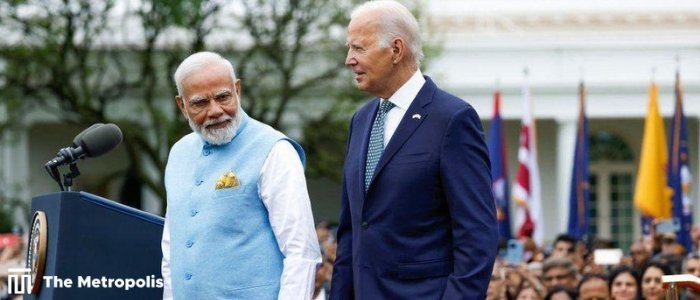Photo: Collected-
Metropolis Desk-
While putting on a show for visiting Prime Minister Narendra Modi on Thursday, US President Joe Biden praised US-Indian relations.
There were marching bands, a sumptuous vegetarian meal, and a 21-gun salute on the South Lawn of the White House.
During his state visit, Mr. Modi also spoke before the US Congress, where he was applauded.
Before he became prime minister, the US had refused Mr. Modi a visa because of worries about his respect for human rights. Now, they saw him as a critical friend.
Although Delhi has never felt completely at ease with the label, Washington has long seen India as a counterbalance to China’s expanding influence in the Indo-Pacific.
Mr. Modi did not specifically mention China when speaking to Congress, but he did refer to “dark clouds of coercion and confrontation casting their shadow over the Indo-Pacific.”
Additionally, Mr. Modi avoided mentioning Russia or the party that instigated the conflict, merely stating that “war has returned to Europe with the Ukraine conflict.”
India hasn’t publicly criticized Russia yet, which observers attribute largely to Delhi’s massive reliance on Russian oil and defense imports as well as its “time-tested ties” with Moscow.
Washington and Delhi’s relationship has been strained as a result, but Mr. Biden decided to emphasize the good, stating that the two nations’ relationships were stronger than ever. It was even described as “one of the defining relationships of the 21st Century” by him.
Mr. Modi concurred, telling the US Congress that this was the union of the two greatest democracies in the world. He added that the friendship would “play a crucial role in enhancing the strength of the entire world.”
The comprehensive and strategic alliance between the two nations, he continued, had a “new chapter” added to it.
For cracking down on dissent, the Indian prime leader has come in for increasing amounts of criticism. His Hindu nationalist administration has also come under fire for failing to do more to safeguard minorities from discrimination and violence. However, despite the demonstrations that accompanied Mr. Modi’s visit to the US, the diaspora, which is sizable and powerful and includes many CEOs from Silicon Valley, welcomed him.
However, several liberal Democrats abstained from his speech before Congress. Representative Alexandria Ocasio-Cortez was one of them and stated on Twitter that those with “deeply troubling human rights records” should not be allowed state visits, the highest level of diplomatic procedure in the US.
Along with the pomp and circumstance, trade activity advanced.
The two nations struck agreements with General Electric and Micron and consented to resolve six pending disputes at the World Trade Organization.
In addition, Mr. Modi took the unusual step of responding to questions from reporters, something he has hardly ever done since taking office as prime minister of India in 2014.
Even as demonstrators gathered outside the White House to oppose his visit, he stated when asked about human rights concerns in India that “democracy runs in our veins” and that there is “absolutely no space for discrimination” in India.
Source- BBC



